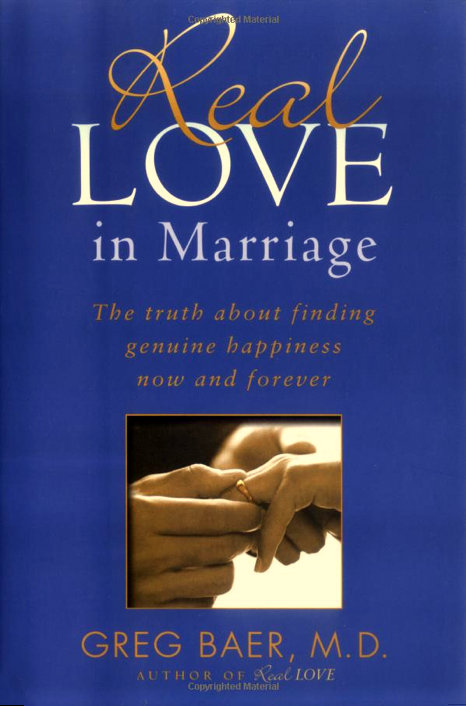Let’s talk!
Can couples have an unconditionally loving marriage? Author Dr. Greg Baer explores this topic in his book Real Love in Marriage, which is the sequel to his first book Real Love. I will highlight some of the practical advice found in this paperback that can help us have a happy union.
Baer summarizes basic principles found in Real Love in the first two chapters of his second book. He reiterates that the essential ingredient for long-term joy in life is real (or unconditional) love. Real love is defined as “caring about the happiness of another person without any thought for what we might get for ourselves”.
When we offer real love to someone, we are not angry or disappointed if the person does not reciprocate or is inconvenient. Unfortunately, most of us have been given conditional love, which has very negative effects on our well-being and that of people around us.
Conditional (or imitation) love implicitly says to people that they will only be accepted if they behave, look, and possess certain mental abilities/qualities. The acceptance received is in the form of praise, power, pleasure, and safety. In this atmosphere, most of us feel empty and afraid and use Getting and Protecting Behaviours such as lying, attacking, acting like a victim, running, and clinging to protect ourselves.
Most people enter into marriage with a lifetime of lack of real love. They usually “fell in love” with their current partner because they were the ones who gave them the greatest amount of imitation love. Sadly, conditional love never lasts because the partners can’t keep up with the charade and eventually show their true colours. Also, the effect of imitation love lessens overtime and a much greater amount is required to have the same effect.
When most people get married, they unconsciously believe that their vows mean:
“I promise to make you happy – always. I will heal your past wounds and satisfy your present needs and expectations – even when you don’t express them. I will lift you up when you’re discouraged. I will accept and love you no matter what mistakes you make. I give you all that I have or ever will have. And I will never leave you.”
According to Baer, the real purpose of marriage is “a commitment we make to stay with our partners while we learn to unconditionally love them”. It also requires that we stay even when our partner is not loving and to limit the sharing of some resources (i.e., sex, money) with that person.
The author introduces the concepts of the Law of Choice and the Law of Expectations. The Law of Choice states that “everyone has the right to choose what he or she says and does”. Therefore even if we are married, we have no right to control our partner’s behaviour.
The Law of Expectations is a by-product of years of lack of real love. Since most of us are starving for true acceptance, we tend to have enormous expectations of people we care about, especially our spouse. If we can’t get the real thing, we will then settle for great amounts of imitation love. The problem is that rarely can one person (i.e., our spouse) fulfill such unrealistic needs, and we become bitterly disappointed when they fall short.
The way to feel truly loved is first by telling the whole truth about ourselves to someone who is able to accept us exactly the way we are. By being seen by these “wise” individuals, we will feel accepted and unconditionally loved for who we really are.
Real love gives us the ability to become ourselves wise men/women and accept others the way they are because we naturally feel loving and safe. That love can be expressed through a variety of actions such as listening to others, apologizing when we make mistakes, performing random acts of kindness, and giving of our time.
 There are common mistakes that couples make in their relationship that can jeopardize the union.
There are common mistakes that couples make in their relationship that can jeopardize the union.
Couples often don’t have a mission statement for their marriage. In other words, both individuals should have as their main goal to do everything they can to make their spouse and marriage their number one priority. Each time either one fails to do so, they put a dent in the stability of the union.
People tend to wait until they have a long laundry list of complaints about their spouse before they try to resolve them. The challenge with this approach is that they are likely to be very angry when discussing this list of grievances, and the partner usually feels attacked and becomes defensive.
The more constructive approach is to determine what is truly important for the health of the relationship, and speak only when both of you are receptive to a genuine exchange.
Baer recommends not compromising when we are trying to resolve an issue with our spouse. He explains that compromise implies that both individuals have to give up something they really want to keep the peace. Instead, when partners are genuinely cooperative, both can have their needs met and be happy.
Although we shouldn’t try to control our mate’s behaviour, we can make clear and specific requests. These requests are made when we are calm and if they agree, we can expect our spouse to follow through. A sure sign that the request is in fact a demand are feelings of disappointment if our partner refuses it.
Many people use sex as a source of praise, power, and pleasure. The long-term result is that sex is unfulfilling because it is used as a form of imitation love. Men tend to enjoy sex even when they feel emotionally disconnected from their partner, whereas most women need to feel loved before opening up sexually.
Ironically, some men may appear “obsessed” with sex when in reality they are attempting to fill the emptiness they feel from a lack of real love. When both partners feel unconditionally loved, the woman’s sexual appetite usually dramatically increases, and the man’s may decrease because the quality of the sex greatly improves. Also, we may perceive our mates as more physically attractive than they actually are because of the shared unconditional love connection. Therefore there is no stronger aphrodisiac than real love.
Most of us were not given the proper tools to have a fulfilling marriage. In his book Real Love in Marriage, Dr. Greg Baer gives practical advice to couples in order for them to achieve lasting happiness by incorporating real love in their lives.
Baer emphasizes truthfulness, personal responsibility, effective communication, commitment, and perseverance in order to have a happy union. Therefore an unconditionally loving partnership is not a fantasy but a reality achievable for many of us.
Interested in buying the book Real Love in Marriage? Click here
Literary Truth
Here are other topics explored in Real Love in Marriage:
- Chores and agreements: the fair division of daily household responsibilities. How to plan, be specific, and keep a written record.
- Discussing each other’s mistakes: how and when to constructively tell the truth to our mates about areas where they need to improve.
- Other aspects of sex: male and female anatomy. How to effectively engage in foreplay/sex with our partner and the importance of orgasm.
- Cheating: the reasons behind unfaithfulness and how to prevent it from occurring. The different forms of cheating and its impact on a marriage.
- Divorce: cases when divorce is necessary. How to amicably separate assets and minimize the negative effects on the children.
References
Baer M.D., Greg, Real Love in Marriage. New York: Gotham Books, 2006.
Picture 1: https://www.amazon.ca/Real-Love-Marriage-Greg-Baer/dp/159240250X/ref=sr_1_1?s=books&ie=UTF8&qid=1377933755&sr=1-1&keywords=Real+Love+in+Marriage#reader_159240250X
Picture 2:https://www.google.ca/search?q=romantic+couples
